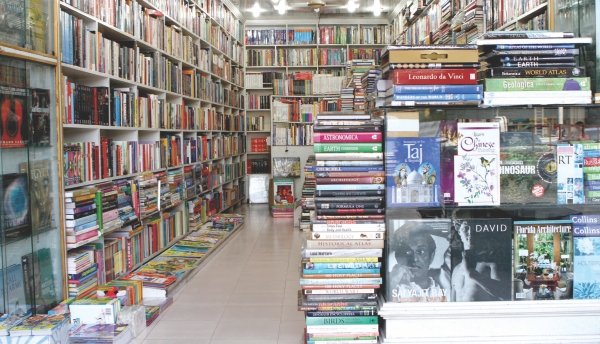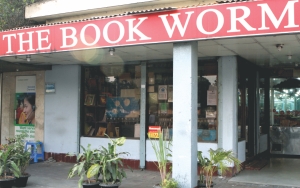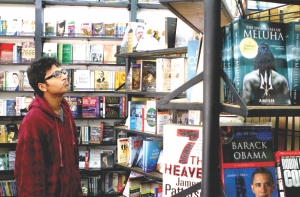| Home - Back Issues - The Team - Contact Us |
 |
| Volume 10 |Issue 37 | September 30, 2011 | |
|
|
Trends
Please Read ANIKA HOSSAIN Once upon a time, not very long ago, there was a city named Dhaka where there was little to do for entertainment. There were very few restaurants, cinemas were an occasional treat, and very few people owned televisions and noone had cable or dvd players. Computers and the Internet were unheard of. Children played outdoors in the fresh air and open fields. Once they were indoors, their parents encouraged them to pursue a form of entertainment, which enriched their lives, sparked their imagination the way even the best of movies with crazy graphics and special effects can't do, and most importantly, it educated them. As most good things do, this special form of entertainment came in small packages called Books.
Those who were avid readers and fervent book lovers passed on this tradition of reading, not only academic books, but books of all kinds ranging from children's fairy tales to comics to romance, mystery, drama, history-you name it. Their children grew up knowledgeable in a wide variety of subjects and with a rich vocabulary. As years passed however, fewer people wanted to read books. The number of bookstores in Dhaka city began to dwindle. ETC, the first proper book store with a large establishment full of both local and foreign books, complete with a coffee shop and comfortable couches where book worms could sit and gobble up their favourite novels, soon closed down due to lack of enough business. “It was a huge disappointment for me,” says Naeema Chowdhury, who visited ETC as often as she could. “I found new, affordable books there and the environment just invited you to go inside and browse,” she says sadly. As the economy became more consumer oriented, large malls spurted up everywhere. These malls have shops for everything, from clothing, shoes, jewellery to electronics and household products. “But excepting one or two, none of these malls have bookstores,” says Aniq Hafiz, who adores books of all kinds. “I find that to be quite tragic because I would like my children to have a large selection of books available to them.” But why did people suddenly stop reading? “It could be because of many reasons,” says Shaheedul Islam, a salesman at Gyankosh, a bookstore in Sobhanbagh for youngsters. “Many children have found other forms of entertainment, like the TV and their computer games. They may also have too much pressure from school work and cannot find enough time to read,” he says. “The prices of books have also gone up considerably in the recent years, due to the increasing import taxes placed on them. Our sales have decreased noticeably since the increase in prices.” Anami Kabir, a booklover living in Dhaka says, “There are many books that I would like to read that are not even available in bookstores here. Most new books are pirated ones being sold on the streets, but at least they are available. The prices in bookstores are extremely steep and not everyone can afford them.” Manager Nasiruddin at Boi Bichitra agrees with Kabir. “Books are far more expensive now since the taxes on them have gone up. We import original books mostly from India but we do have photocopied books available at this store of books we cannot import. We get these from Nilkhet. Sales have gone down since the price increase but we manage somehow.” “There is a large collection of books available in New Market,” says Nasreen Jabeen, “But you have to look carefully before you can find ones you want. Also, these stores aren't exactly proper book stores—there's no place to sit or browse books properly, but it's better than nothing. The proper bookstores charge too much!” The few proper bookstores remaining in Dhaka are Bookworm near the old airport road, Omni Books and Words and Pages in Gulshan. But these too, face difficulties with their sales. “Book sales went down considerably after the Caretaker Government's tenure came to an end,” says Mustaq Ahmed, the proprietor of Words and Pages. “While they were still in power, my business mainly depended on foreign customers (70%), but unfortunately foreigners worry about their personal safety and do not frequent my store anymore.” According to Ahmed, most local book lovers who can afford to buy books at their inflated prices just prefer to get their books from abroad, where they can get a larger selection to choose from. “We don't import enough books,” says Ahmed, “We only import from India and China and sometimes Malaysia because air freight is expensive and there are high import taxes and VAT placed on books. Importing books by DHL is also extremely pricey.” To set up shop in areas like Dhanmondi and Gulshan, one must be ready to pay high rent, overhead and maintenance cost, which ultimately increases the prices of books. But every businessman has to make a profit. “Establishments costs are extremely high nowadays,” agrees Rafiqul Haque, the manager of Bookworm. “We sell original books so the prices are a little high to begin with, if you add VAT to that, we don't have any books below TK 500. The same books are being photocopied and sold on the streets for less than half the price so obviously our sales will suffer,” he continues. “New Market and Bakshi Bazaar have some book stores but those don't suit everyone. I simply can't cater to everyone's needs with all these limitations,” says Ahmed. According to Ahmed, the book market in Bangladesh does not generate enough revenue for the government. “We don't export books except to very few places like Jackson Heights in New York and Brick Lane in London. Because of the e business, we sell even less books than before. Even local books are being published abroad because of low sales in this country,” says Ahmed. “What we need is the government to encourage the sale of books through book promotions and export,” continues Ahmed. “If there are a few book stores set up in the government markets at reasonable prices, this will help encourage people to read. Given a chance, books can generate large revenues for the government as they do in countries like India.” Reduced taxes and VAT can help reduce prices of books, but each of us have our own part to play in order to encourage reading. Parents must start buying books for their children to get them into the habit of reading. Reading is and always will be one of the most pleasurable pastimes, and no one should be deprived of it. Those who love to read must try to promote their local market by purchasing more books. If one can spend thousands buying dvds every month, the same amount will be equally, if not better spent by investing it in a good book.
Copyright
(R) thedailystar.net 2011 |


